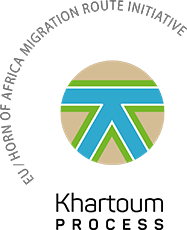The second webinar in the 4-Module Webinar Series titled Trafficking in Human Beings: The 4Ps Revisited was carried out in the framework of the Khartoum Process on 28 April 2021.
The objective of this webinar was to present regional and national good practices linked to the protection of victims of trafficking by exploring structural and policy responses, as well as the direct support and assistance provided to victims. The virtual event gathered over 140 participants from a broad geographical range, welcoming delegates from Khartoum Process member states and institutions, international organisations, NGOs, and academia, laying the grounds for a rich exchange.
In her keynote speech, Ms. Conny Rijken, Professor of Human Trafficking and Globalisation at Tilburg University, set the stage with respect to the issue of human trafficking and victim protection, looking at the importance of understanding victims of trafficking, the (difficult) identification of victims, and lack of self-identification, as well as proper assistance and obstacles thereof. She also highlighted some of her research findings concerning the obstacles in criminal proceedings, among which the duration of proceedings, the detailed questioning or the victims not being believed/taken seriously.
The first session focused on structural and policy measures as prerequisites for the successful provision of support and assistance to victims of trafficking, starting from identification to referral to shelter provision and rehabilitation. Mechanisms such as National Action Plans, National Referral Mechanisms and Standard Operating Procedures are the structural backbone of practical responses. In the Khartoum Process region, there are numerous good practice examples, both in Europe and in Africa. In this session, Mr. Vincent Cochetel, Special Envoy for the Central Mediterranean Situation, UNHCR and General Counselor Siham Osman Mohamed – Undersecretary of the Ministry of Justice and Head of the NCCT, Sudan were invited to speak on the importance of National Action Plans and the recent update of Sudan’s National Action Plan to Combat Human Trafficking and the provisions on victim protection.
The second session looked at concrete examples of victim assistance and protection. Ms. Suzanne Hoff, International Coordinator at La Strada International, spoke about European assistance and protection mechanisms in place, integration and reintegration, as well as access to compensation and to residence as a means of supporting the integration of victims of trafficking. Ms. Raoudha Laabidi, President, National Authority to Combat Trafficking in Persons, Ministry of Justice, Tunisia, elaborated, among others, on Tunisia’s support to foreign victims of trafficking, including physical protection, legal assistance, temporary residence permits, social and medical assistance etc.
Following the presentations, rich discussions ensued through audience participation and interventions. The Khartoum Process Secretariat is glad that, despite the lack of in-person meetings, it has been possible to facilitate an exchange of good practices, in the spirit of partnership and collaboration which are at the core of the Khartoum Process.








